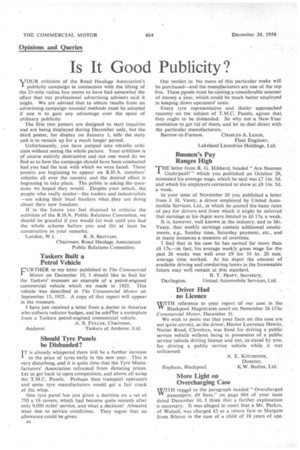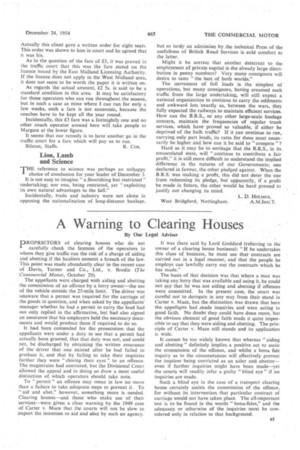Opinions and Queries
Page 30

Page 31

If you've noticed an error in this article please click here to report it so we can fix it.
Is It Good Publicity?
VOUR criticism of the Road Haulage Association's L publicity campaign in connection with the lifting of the 25-mile radius ban seems to have had somewhat the effect that our professional advertising advisers said it might. We are advised that to obtain results from an advertising campaign unusual methods must be adopted if one is to gain any advantage over the spate of ordinary publicity.
The first two posters are designed to start inquiries and are being displayed during December only, but the third poster, for display on January 1, tells the story and is to remain up for a much longer period.
Unfortunately, you have jumped into vitriolic criticism without seeing the whole picture. Your crititism is of course entirely destructive and not one word do we find as to how the campaign should have been conducted had you had the task with which we were faced. These posters are beginning to appear on R.H.A. members' vehicles all over the country and the desired effect is beginning to take place. The public is asking the questions we hoped they would. Despite your attack, the people who really matter—the traders and industrialists —are asking their local hauliers what _they are doing about their new freedom.
If in the future you feel disposed to criticise the activities of the R.H.A. Public Relations Committee, we should be grateful if you would (a) wait until you had the whole scheme before you and (b) at least be constructive in your remarks.
London, W.I. R. B. BRITTAIN, Chairman, Road Haulage Association Public Relations Committee.
Taskers Built a Petrol Vehicle
FURTHER to my letter published in The Commercial Motor on December 10, I should like to find for the Taskers' museum an example of a petrol-engined commercial vehicle which we made in 1925. This vehicle was described in The Commercial Motor on September 15, 1925. A copy of that report will appear in the museum.
I have just received a letter from a doctor in America who collects radiator badges, and he asks"for a nameplate from a Taskers petrol-engined commercial vehicle.
A. B. FULLER, Chairman,
Andover. -Taskers of Andover, Ltd.
Should Tyre Panels be Disbanded?
IT is already whispered there will be a further increase
in the price of tyres early in the new year. This is very disturbing, and it is quite time that the Tyre Manufacturers' Association refrained from dictating prices. Let us get back to open competition, and above all scrap the T.M.C. Panels. Perhaps thentransport operators and some tyre manufacturers would get a fair crack of the whip.
One tyre panel has just given a decision on a set of 750 x •16 covers, which had become quite smooth after only 9,000 miles' service, and what a decision! Ab5asive wear due to service conditions. They regret that no allowance could be given.
54 Our verdict is: No more of this particular make will be purchased—and the manufacturers are one of the top five. These panels must be costing a considerable amount of money a year, which could be much better employed in keeping down operators' costs.
Every tyre representative and dealer approached , recently on the subject of T.M.C. Panels, agrees that, they ought to be disbanded. So why not a New-Year resolution to get rid of them; and let us deal direct with the particular manufacturers.
Barrow-in-Furness. CHARLES A. LEIGH, Fleet Engineer, Lakeland Laundries Holdings, Ltd.
Busmen's Pay Ranges High
THE letter from R. G. Hibberd, headed "Are Busmen
Underpaid?" which you published on October 29, misstated his average wage, which he said was £7 16s. 5d. and which his employers corrected to show at £8 14s. 5d. a week.
In your issue of November 26 you published a letter from J. H. Vasey, a driver employed by United Automobile Services, Ltd., in which he quoted the basic rates of pay for drivers and from which it might be inferred that earnings at his depot were limited to £6 17s. a week.
It is, however, well known in the industry, and to Mr. Vasey, that weekly earnings contain additional emoluments, e.g., Sunday time, Saturday payment, etc., and in .many instances ameasure of overtime.
I find that in his case he has earned far more than £6 17s.—in fact, his average weekly gross wage for the past 26 weeks was well over £9 for 54 hr. 20 min. average time worked. At his depot the amount of available driving and conducting hours in the foreseeable future may well remain at this standard.
B. T. PRATT, Secretary, Darlington. United Automobile Services, Ltd.
Driver Had no Licence
WITH reference to your report of our case in the " Blackpool Magistrates courr on November 26 (The Commercial Motor, December 3).
We wish to point out that your facts on this case are not quite correct, as the driver, Hector Lawrence Hewitt, Nutter Road, Cleveleys, was fined for driving a public service vehicle without being in possession of a public service vehicle driving licence and not, as stated by you, for driving a public service vehicle while it was unlicensed.
A. E. KTFCHENER, Director, Bispham, Blackpool. K.W. Bodies, Ltd.
More Light on Overcharging Case
WITH regud to the paragraph headed "Overcharged VY passengers: £9 fines," on page 604 of your issue dated December 10, I think that a further explanation is necessary. It was alleged in court that a Mr. Parkes, of Walsall, was charged £3 as a return fare to Margate from Bitston in the case of a child of 10 years of age. Actually this client gave a written order for eight seats. This order was shown to him in court and he agreed that it was his.
As to the question of the fare of £3, it was proved in the traffic court that this was the fare stated on the licence issued by the East Midland Licensing Authority. If the licence does not apply in the West Midland area, it does not seem to be worth the paper it is written on.
As regards the actual amount, £.2 5s. is said to be a standard condition in this area. It may be satisfactory for those operators who can run throughout, the season, but in such a case as mine where 1 can run for only a few weeks, such a fare is not economic, because the coaches have to be kept all the year round.
Incidentally, this £3 fare was a fortnightly one and no other coach operator around here will take people to Margate at the lower figure.
It seems that our remedy is to have another go in the traffic court for a fare which will pay us to run.
Bilston, Staffs. R. Cox.
Lion, Lamb and Science
THE reference to science was perhaps an unhappy choice of conclusion for your leader of December 3. It is not easy to imagine "a flourishing but restricted" undertaking; nor one, being restricted, yet "exploiting its own natural advantages to the Lull."
Incidentally, trade and industry were not alone in opposing the nationalization of long-distance haulage,
but so tardy an admission by the technical Press of the usefulness of British Road Services is cold comfort to the latter.
Might it be correct that another deterrent to the employment of private capital is the already large distribution in penny numbers? Very many consignors will desire to taste "the best, of both worlds."
The movement of full loads is. the simplest of operations, but many consignors, having creamed such traffic from the large undertaking, will still expect a national organization to continue to carry the oddments and awkward lots 'exactly as, between the wars, they fully expected the railways to maintain efficient services. How can the B.R.S., or any other large-scale haulage concern, maintain the frequencies of regular trunk services, which have proved so valuable, if either be deprived of the bulk traffic? If it can continue to run, carrying only part loads, its rates for these must necessarily be higher and how can it be said to " compete " ?
Hard as it may be to envisage that the B.R.S., in its emasculated state, will "continue to contribute a fair profit," it is still more difficult to understand the implied difference in the natures of our Governments; one declared in favour, the other pledged against. When the B.R.S. was making a profit, this did not deter the one from redeeming its pledge, but apparently, if a profit be made in future, the other would be hard pressed to justify not changing its mind.
L. D. HOLMES, West Bridgford, Nottingham. A.M.Inst.T.












































































